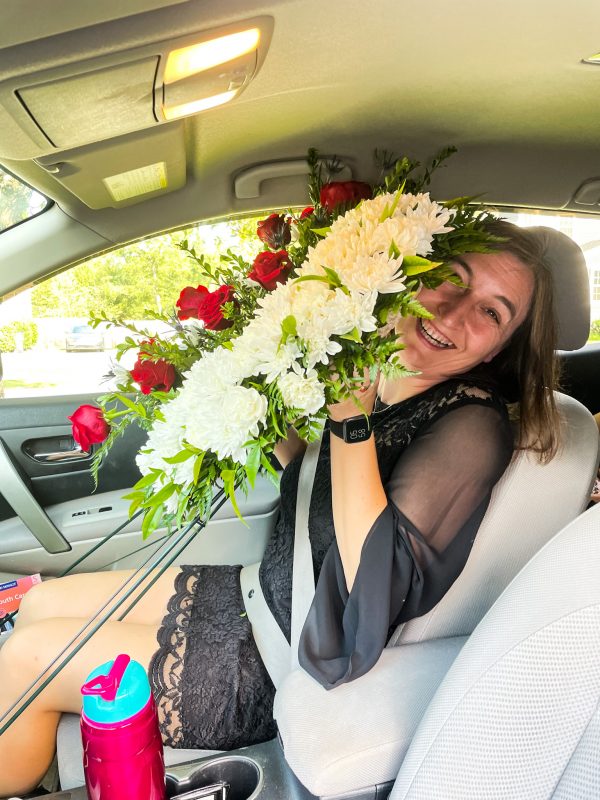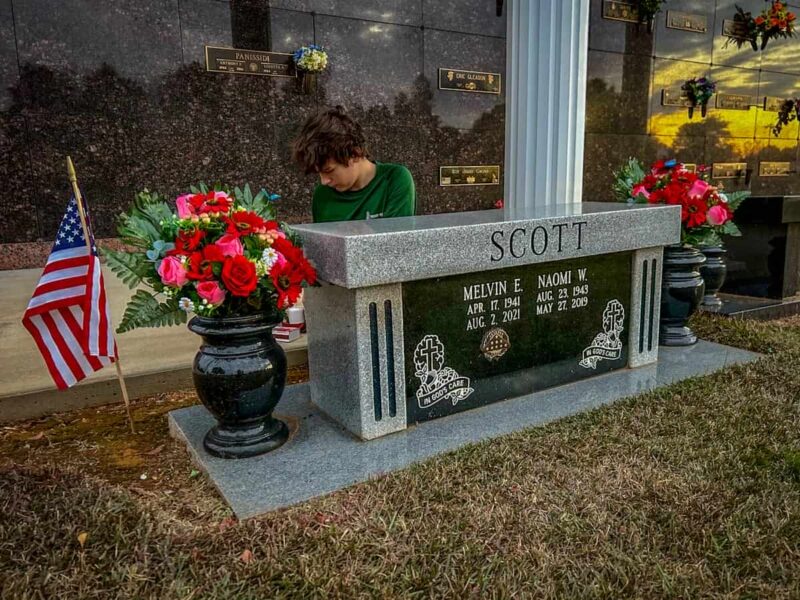
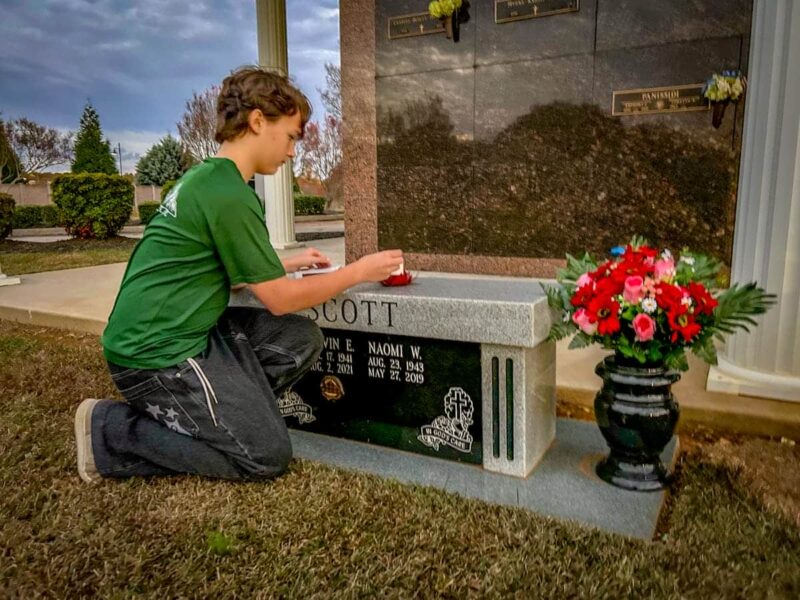


One of my daily rituals is to look through the Time Machine widget at the bottom of this page: it combs through all 7,000+ posts here at MTS and finds the ones published on today’s date. Twelve years ago today, we threw a surprise birthday party for Nana, who was turning seventy.
We invited some friends but mainly family to the occasion, and since both of Nana’s brothers had passed years before, it was mainly from Papa’s side of the family. Three of his four sisters came. We had a cookout and some cake, then we took the Boy on a train ride in the park we were at. The family stood by the fenced-off track and waved at us as we passed. Of the five that were there waving, four have passed away. Of the other guests, three more have passed since then.
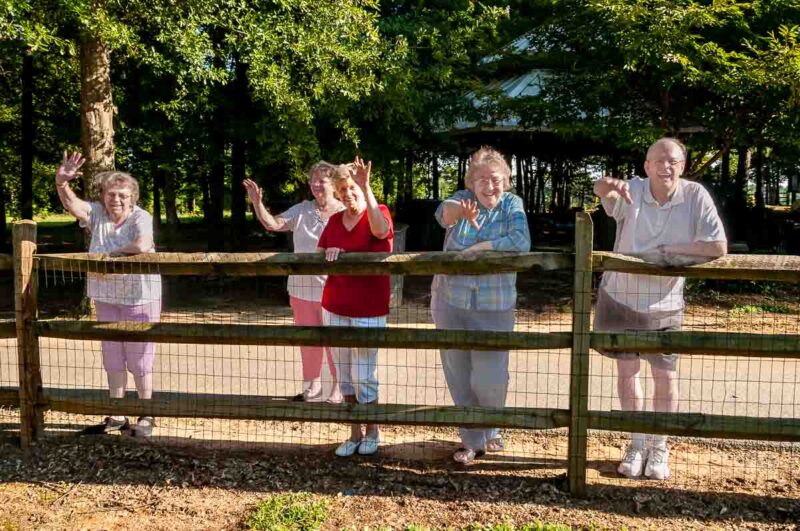
Twelve years is not a terribly long time, and yet six of our guests have passed in that time. That’s one every two years. That’s too many too quickly, but it’s to be expected. It just surprises everyone, I suspect, when it starts happening to those around them.
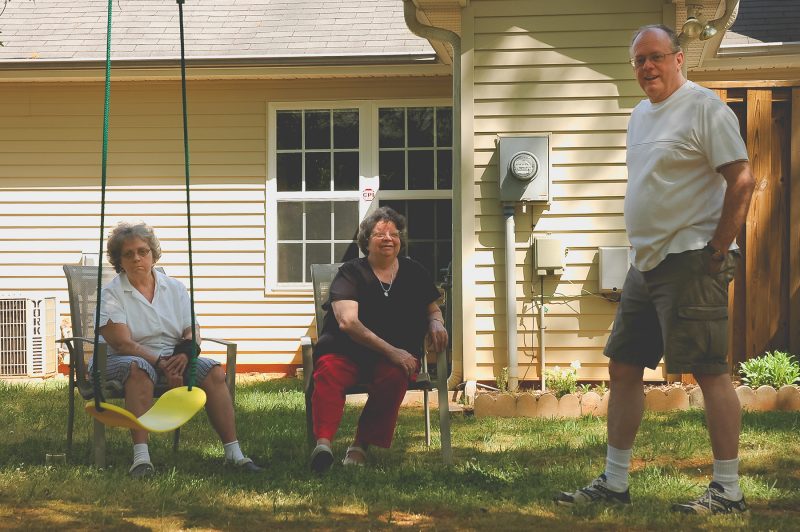
All gone now.
It’s been five years now since Nana passed. E is the same age now that L was then, and now L is only a few short months from being a legal adult.
A common theme in my writing is the suddenness and recurrence of my realization o f just how much time has passed since a certain event, and using that realization to project into the future with the realization that it will come just as quickly as this moment has arrived. Almost thirty years ago, for example, I left for Poland for the first time; project those same nearly-thirty years into the future, and I’m almost eighty, the age Papa died two years after Nana, now three years ago. See? I just did it again: created a loop of time.
In those five years since Nana’s passing, the GIrl has grown almost an entire foot; the Boy has reached a point that we just barely have to look down while talking to him. In those dunce years since Nana’s passing, the Girl has become a volleyball star and broken then re-broken high school track and field records; the Boy has picked up guitar and trombone as well as becoming a confident soccer player.
In another five years, the Girl will be finishing up college, lining up graduate school (with her interests, she will likely end up getting a doctorate straight away), and firmly established in a life of her own, a life without (to some degree) K and me. In another five years, the Boy will be almost done with high school, thinking about college, and probably still playing trombone and Fortnite. I’ll be creeping ever-nearer my sixties; K will be in her fifties.
With all this in my head, we go to Polish mass in the afternoon, and while everyone is getting the pot luck afterward read, the Boy heads out to the playground and it’s clear how much he’s changed…
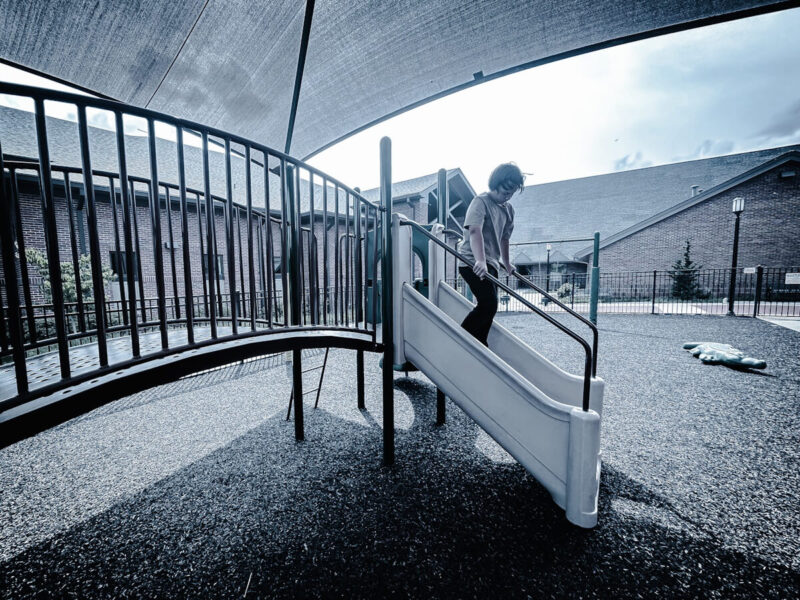
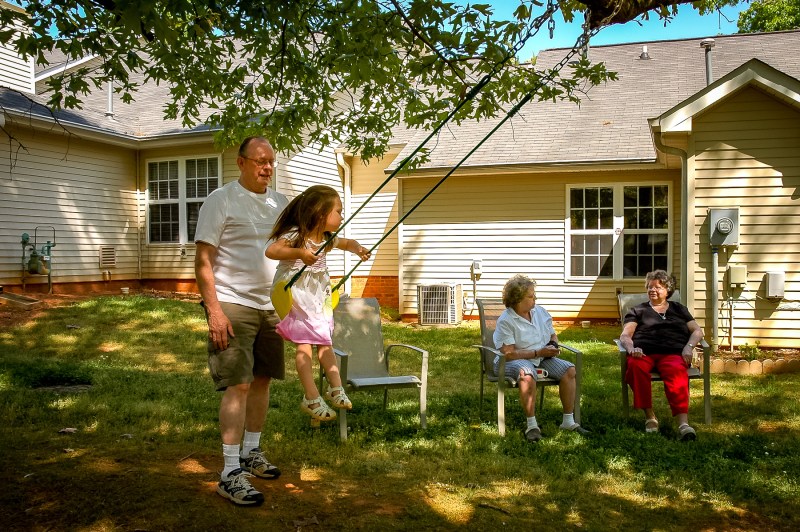
Today is Thursday. Papa’s birthday the year of this picture (what was it? 2010? 2011?) was on a Thursday as well, I believe. Now only L remains.
Written on Wednesday 14 July 2021 at 6:54 PM
Getting out of bed is so simple an act that we do it without thinking. We might sometimes want to stay in bed a bit longer, but the act of slinging our feet off the bed and hoisting ourselves into a sitting position — we don’t give that much thought.
When I had my hernia surgery some six years ago, I realized how much we use our abdominal muscles to get out of bed, and because those muscles were terribly sore after surgery, I thought very much about getting out of bed. It was painful, and I wanted to get out of bed quickly to lessen the time my muscles burned, but the act of getting out of bed quickly made them hurt all the more. It was a lose-lose situation. The decision to get out of bed, then, was always a reluctant one.
On the other hand, every time I’ve overslept, I’ve leapt out of bed in a single motion, and it’s a conscious act: I’ve got to get out of the bed as fast as possible and into the shower as fast as possible so I can get dressed and bolt downstairs as fast as possible to grab something to shove down my throat as fast as possible so I can get to work as fast as possible.
Other than that, I rarely think about getting out of bed. The physical act is simple, effortless, and without consideration of its simple significance, a significance that doesn’t appear as such until the ability to do so disappears.
In two or three weeks my father has gone from being semi-independent (such that we could leave him alone for stretches up to eight hours) to being completely bedridden. I don’t think he’s quite come to accept that fact or even completely to understand it. There’s still hope in his mind that he will one day be walking again. I don’t think that’s the case; the doctors don’t think that’s the case; and deep down, he probably doesn’t think it’s the case. Several times a day he tries to get out of bed only for us to remind him that it’s not safe for him to get out of bed. He says things like, “I can’t wait until I get out of this bed and get back to normal.” He doesn’t realize that this new normal is just that, nor does he realize that tragically this new normal will only last for some period of time (weeks? months?) before the next dip, the next drop in his condition, the next “new normal.”
Every new normal makes the previous one look like a paradise. Every new normal reminds us all anew that no matter how trying and depressing for all of us involved, it’s only going to get more trying and more depressing. Every new normal makes the old one seem eons ago. Every new normal quickly begins to feel like it will always be normal, that it will stagnate. That it has stagnated. And then another dip. Another episode. Another new normal.
And the bed he occupies becomes his whole environment, his whole world, his prison.
How anyone could watch how this man is suffering mentally and emotionally and believe that the god he dedicated his life to, supported fiscally (so to speak), and was eternally devoted to would turn his back on him in his time of need — how anyone could think in such a situation that a god like that could exist, and if that god did exist, how it could be considered anything other than capricious and evil, I just don’t know. Belief gives hope, apologists claim. Yet it also gives despair. “What have I done to deserve this?” Dad has asked in his lucid moments. “Why won’t God do something after I’ve devoted my life to him?” Nana pleaded. For both of them, I think, it’s not a matter of “Why doesn’t God heal me so I can go back to my normal life” but something more basic: “Why is God allowing me to suffer like this instead of just letting me die peacefully in my sleep tonight? Why do I wake up day after day to this same prison?”
He remains, as far as I can tell, steadfast in his faith. “I know where I’m going” is his general demeanor, and that might give him some comfort. But I can’t help but think that perhaps that comfort is not worth the anguish it also brings.
In the meantime, we try to comfort him in those admittedly-rare moments of angst, keep him calm throughout the day, and help him take each day in his bed one moment at a time. I don’t know that there’s much more we could hope to do.
We ate zurek:

We went to show Babcia Nana’s and Papa’s grave:
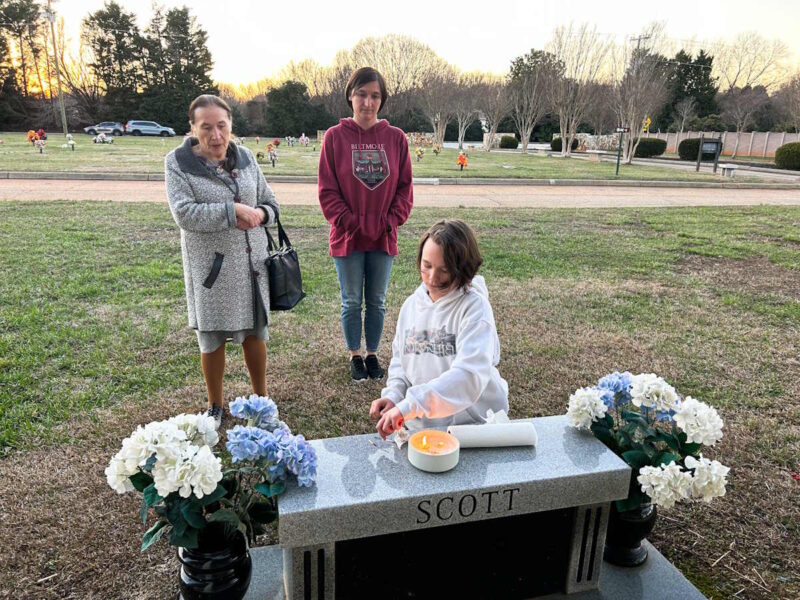
And surprisingly, no one went near a church…
We’re still settling into a new routine with Babcia. K has gotten her old phone charged and running, but the closest Babcia has come to an iPhone is the old tablet we bought her years ago.

Nana struggled with smartphones as well. Papa made the switch fairly easily, and then when we brought him an iPhone to replace his Android phone, he made the shift without much complication. Nana just experienced frustration: a few tries, and she was done.
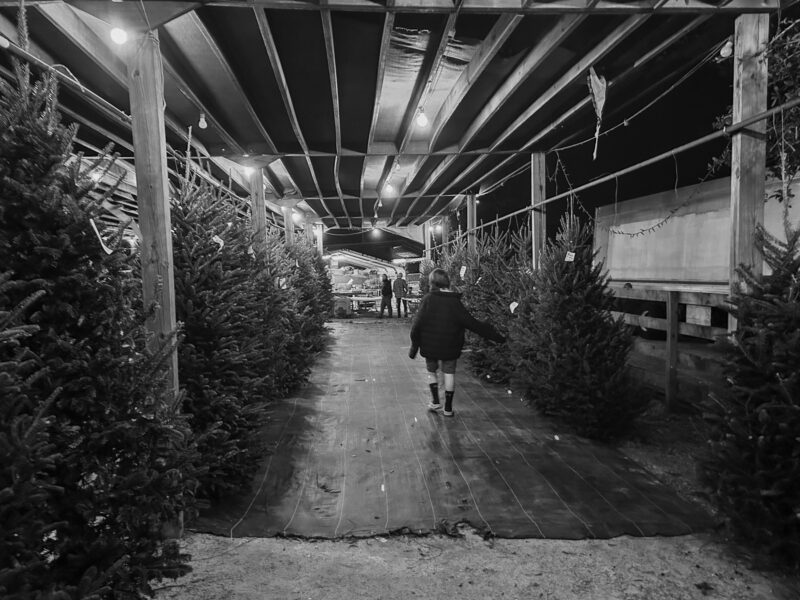
“I can’t even answer Papa’s phone!” she once declared. She just handed it to him. She wasn’t having it.
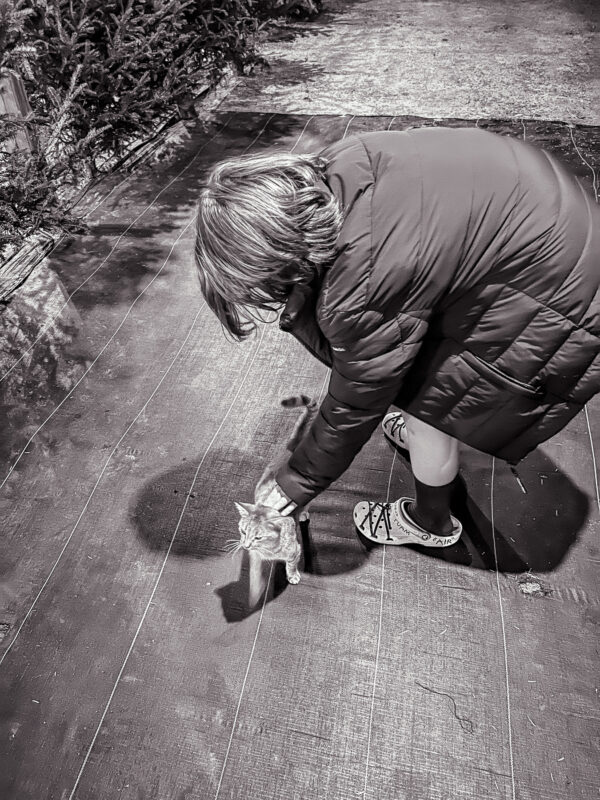
I sometimes wondered if it wasn’t a sort of willful helplessness: she’d never had any problem learning new things in the past. When Papa brought home a new computer in the early eighties, she learned how to use it. Each time he upgraded after that, she learned how to use it. New software, new user interfaces (i.e., the mouse). But for whatever reason, she just never had the motivation to learn how to use a smartphone.
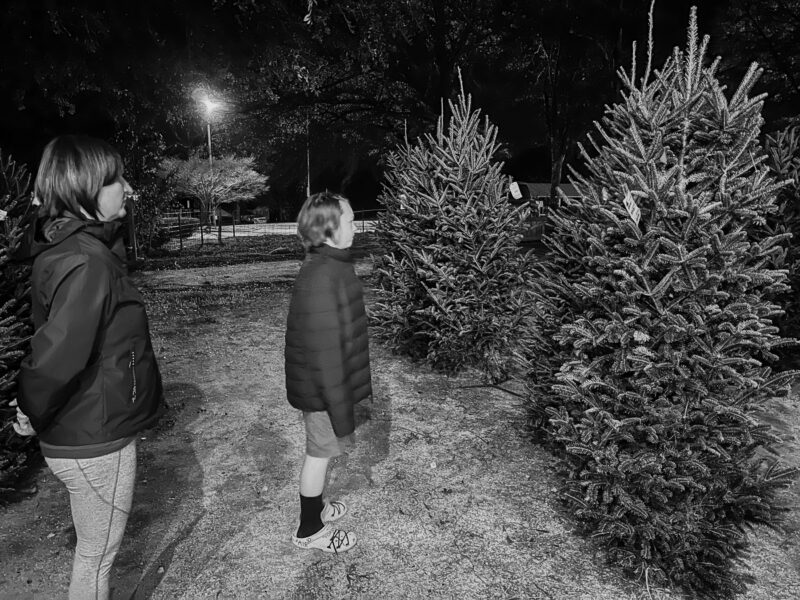
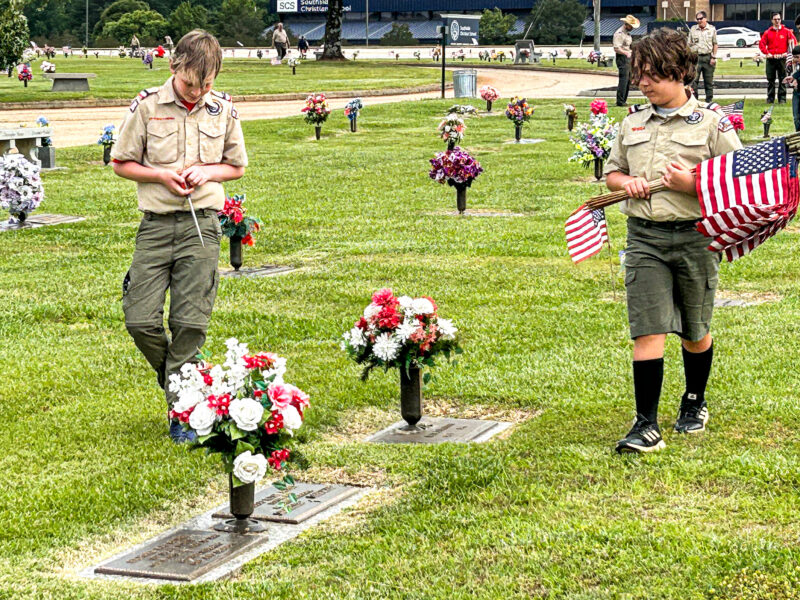
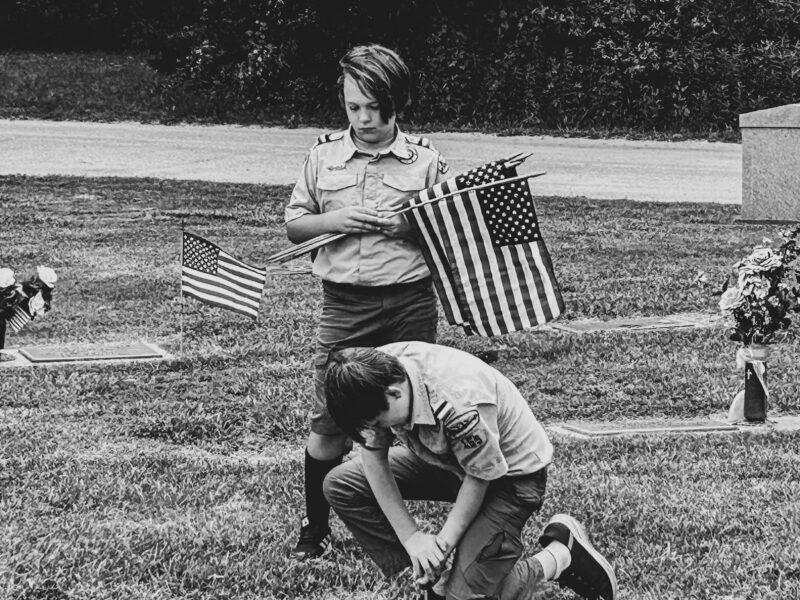
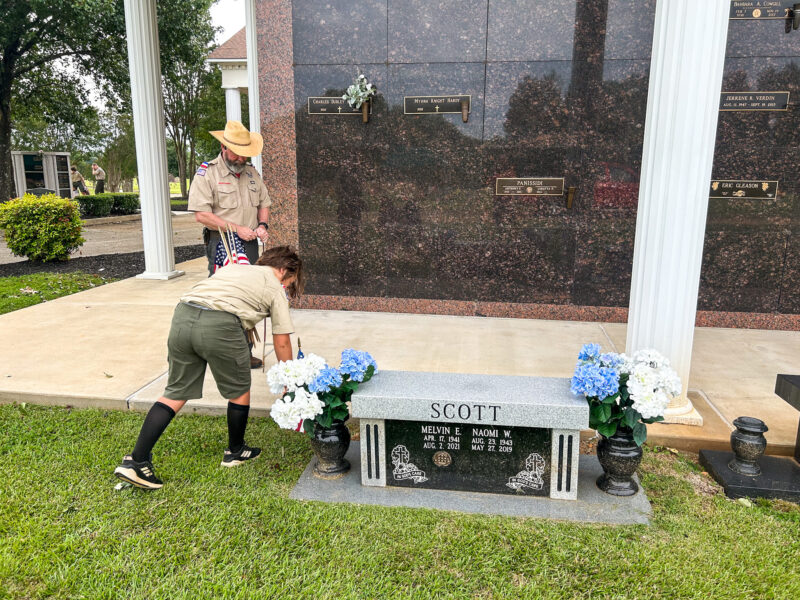
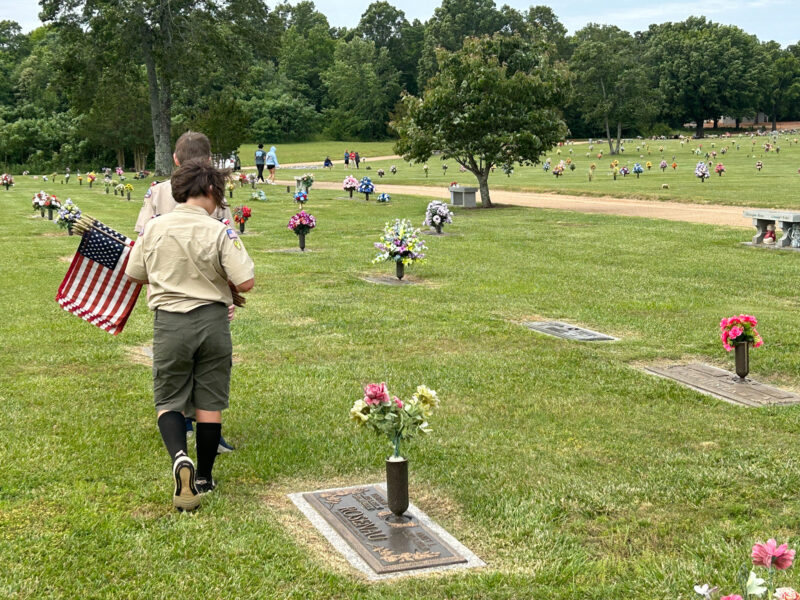
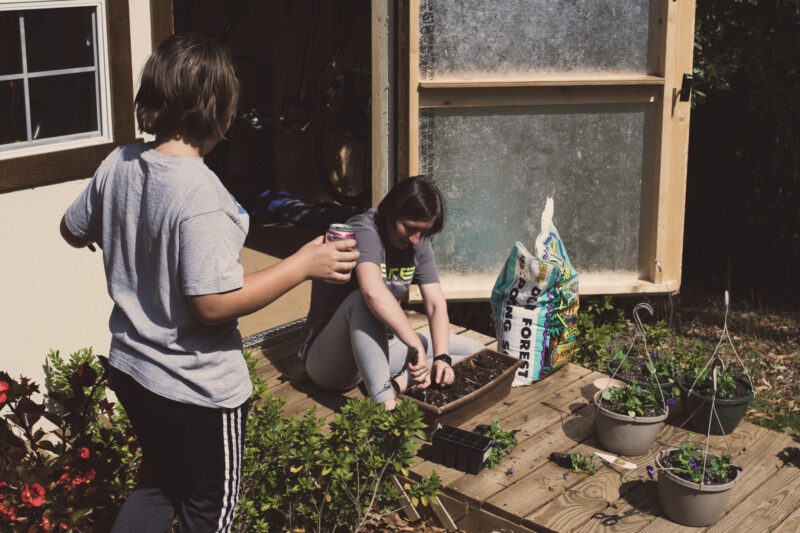
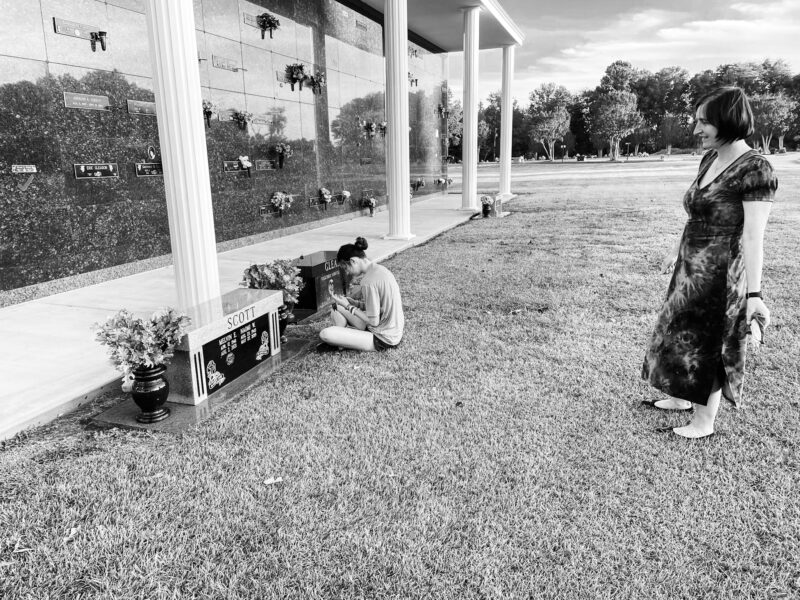
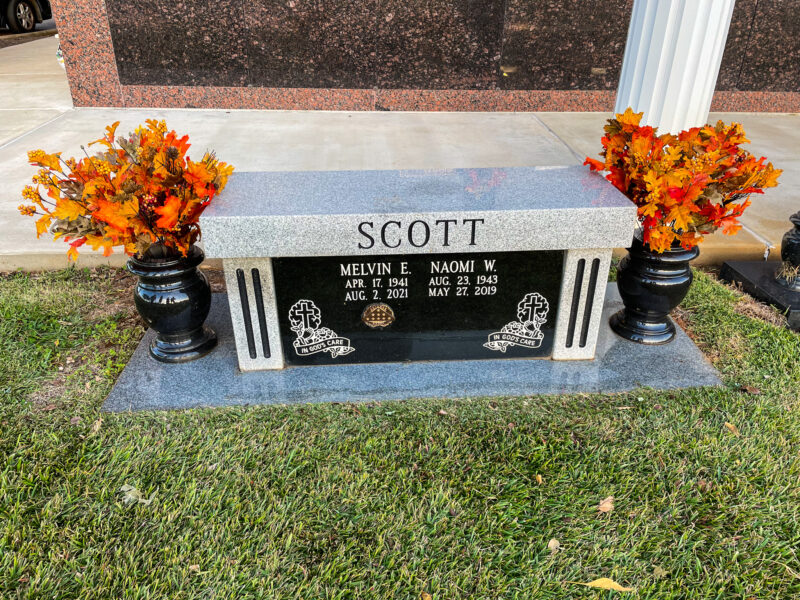
Nana and Papa helping us move from Ashville to Greenville — fifteen years ago.
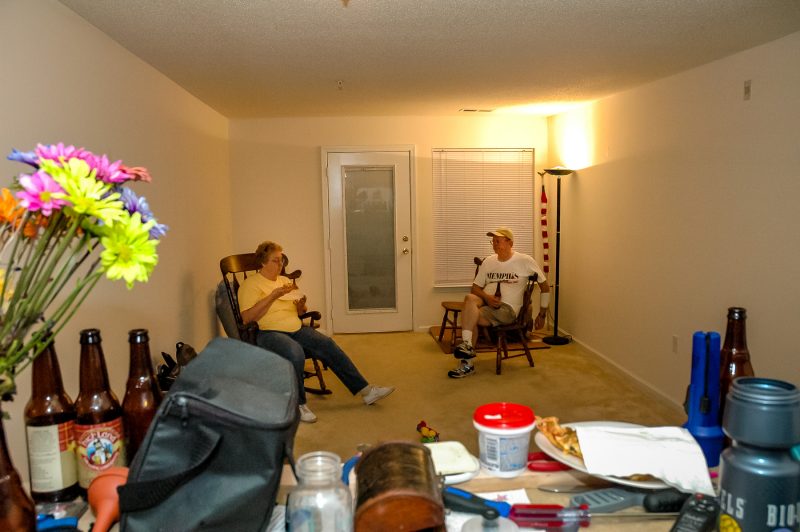
In some ways, Papa’s passing was much more difficult for me than Nana’s. When Nana died in 2019, I was more worried about Papa than I was myself. I was heartbroken, to be sure, but Papa was devastated. The love of his life, the woman who, in many ways, literally saved his life, was gone. His constant companion for decades was no longer by his side. How would he take it? Would the sorrow he was buried in bury him, too? So when Nana passed, I had a job to do, and a very important job: look after Papa, physically and emotionally (and, while he could still get out of the house, spiritually as we made sure he got to church for the services and community that did so much for him).
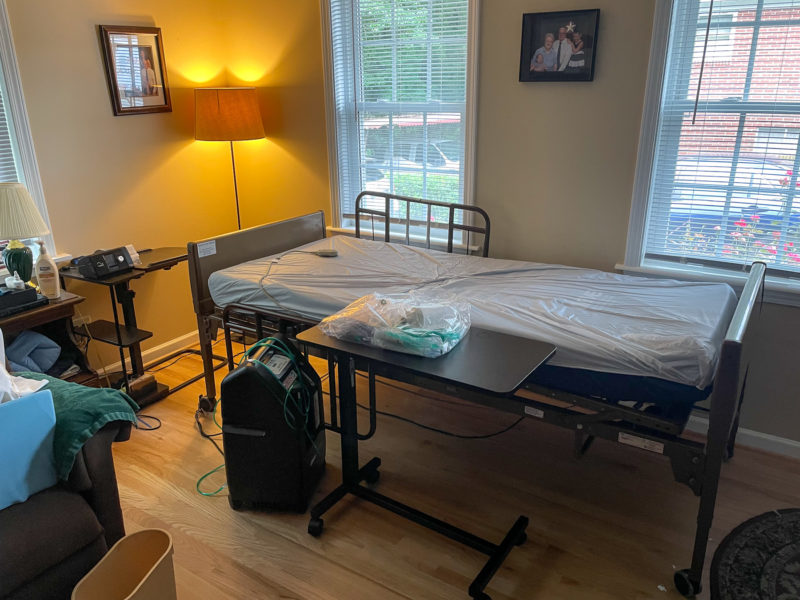
We played family games with him, sat and talked to him, watch movies with him, helped him with his exercise and, after his Parkinsons kicked in fully, his physical therapy. As Parkinsons took control, we took on even more responsibilities, more basic responsibilities, more primal responsibilities: feeding him, cleaning him, and all the complications a more bed-bound existence comprise.
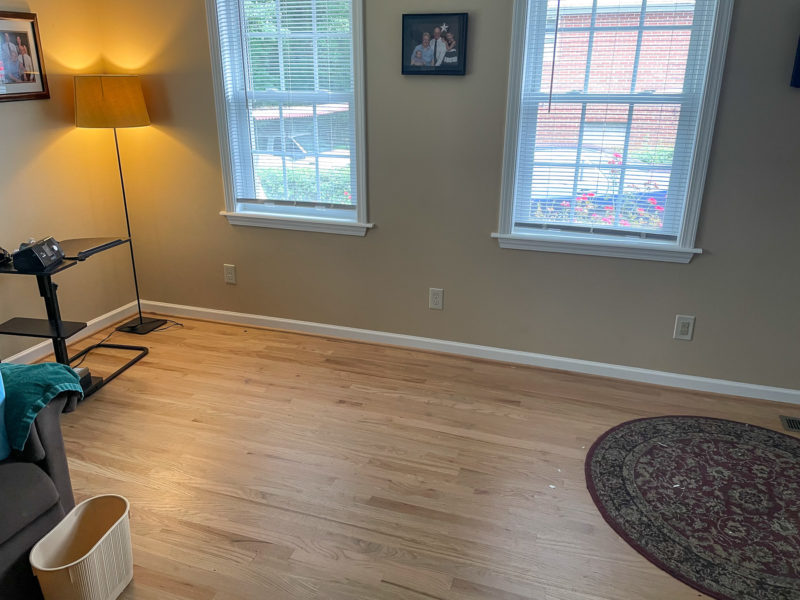
Nana’s death was also easier for me emotionally because I had all the support around me that Papa had around him. K and the kids gave me as much support, directly and indirectly, as we gave Papa.
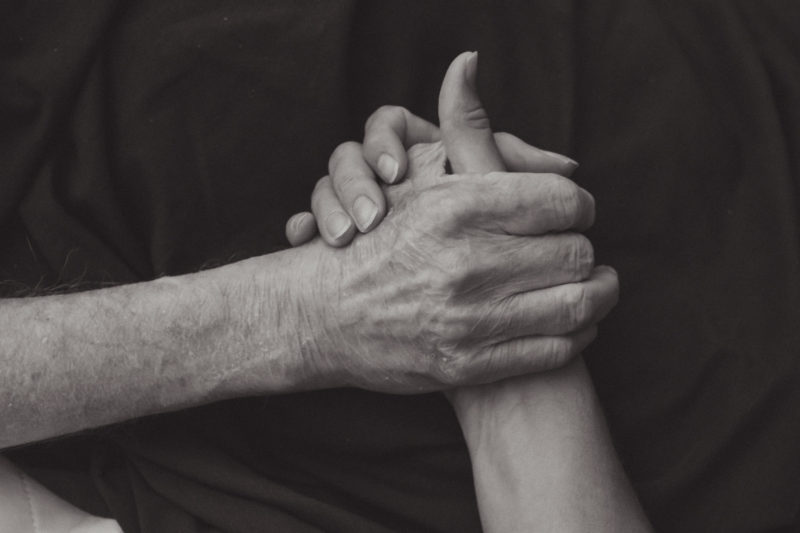
Sometimes, I just get to thinking about Nana…
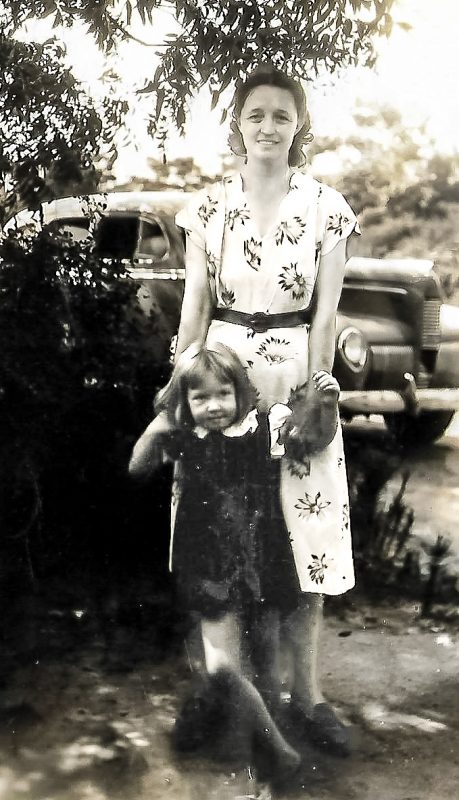
The Boy has become interested in ciphers and codes. They learned about them in school this week and so he wants to learn about more of them. Tonight, he and I were writing things back and forth in pig pen cipher:

It’s a simple replacement cipher, but the Boy loves it.
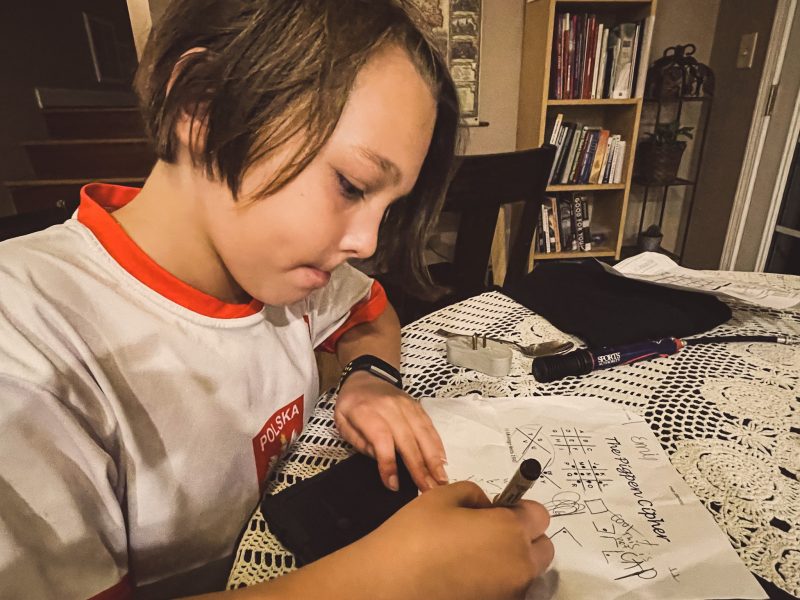
During our evening walk, I mentioned to him that Papa knew a real code: Morse Code.
“Really?!”
I thought Papa had mentioned that so many times, doing his “da-dit-dit” routine to spell various words out in code, that no one could have forgotten about that. Apparently, E had.
“I wish Papa was still here.”
We’ll be having those moments for some time to come, I think.
As we go through life, we start to see things differently. That really goes without saying, I know, but looking over old photographs makes this so much more literal. I saw today a photograph from 2015 and immediately saw flaws in it. The newest iteration of Lightroom allowed me to fix some of the flaws, but not all of them.
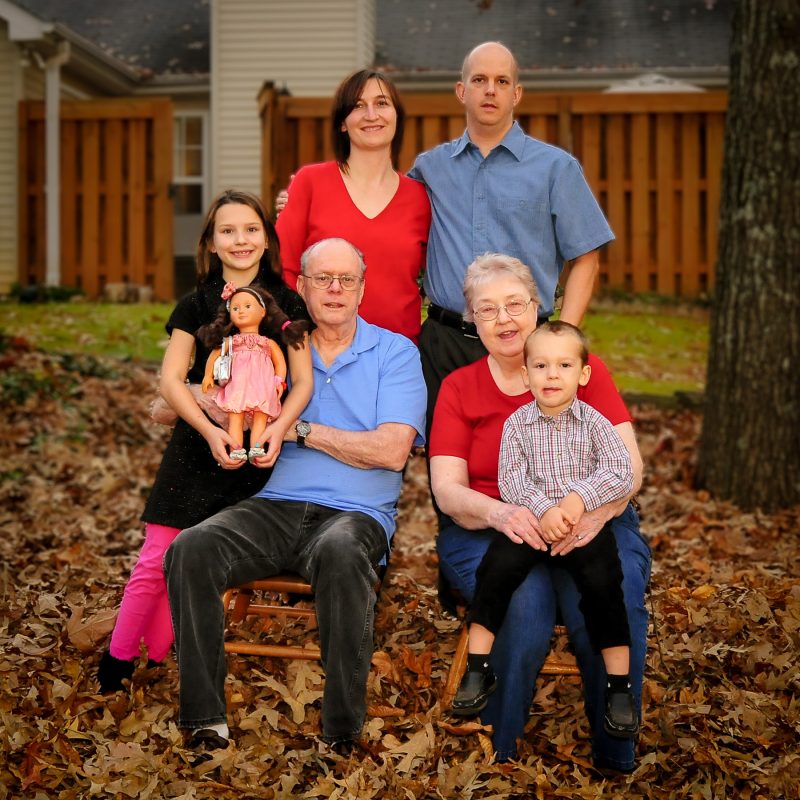
It was the little things.
That gate behind us — why didn’t I think to close it? It would have made the background that much more fluid. (Perhaps I thought I had. Maybe I closed it, but something opened it back up — wind, gravity, a squirrel.)
Why didn’t we move further down the hill so that more leaves would be behind us? It was a simple fix — why didn’t we see it? (Maybe we did — maybe we were as far down as possible. Perhaps just beyond the bottom of the frame the leaves disappear.)
Why didn’t I open the aperture a little more to get a little creamier background? (Perhaps it was as wide open as possible — in 2015, we still didn’t have a great portrait lens. Truth be told, we still don’t, but we’ve got a much better lens than I would have used for this picture.)
It’s no big deal, obviously, but looking back, I see so much wrong with this.
I had a similar thought in Polish Mass today. I hadn’t been to Mass since the last Polish Mass a month ago, and the less frequently I go to Mass, the more foreign it seems. Everyone going onto the stage (I know that’s not what it’s actually called but I can’t remember what it is called, and since it’s an elevated platform upon which the whole ceremony is conducted, it is, for all intents and purposes, a stage) stopped and bowed or genuflected. When I first saw people doing that in Poland, I was curious: why are they doing all that bowing? Once I learned about the idea of the real presence of Jesus in the host (i.e., the idea that somehow the bread ceases to be bread and is actually the body of Jesus), I understood what was going on. It still didn’t make sense because I didn’t believe that was the case, but I understood why they did it.
When I tried being a Catholic, that was one of the doctrines that I thought was just a little off but put it out of my mind. I behaved as if I believed it even though, deep down, I know I never did. It doesn’t make any sense: the official church teaching is that nothing physically changes. You can press a priest on the matter, and he’ll even admit that nothing atomically changes. The logical conclusion: if nothing atomically changes, then nothing changes. Full stop. The bread is made of molecules which are made of atoms which are made of subatomic particles. If nothing in that chain of being changes, then nothing changes. It’s not complicated logic — it’s quite basic in fact.
Yet Catholic apologists will start talking about substance and accident and making Aristotelian moves to suggest that the thing that makes bread bread — the substance — changes but the outward appearance doesn’t. Yet nothing makes bread bread. “Bread” is the name we give molecules of wheat, water, and usually (though not in this case) yeast that have undergone chemical changes through the application of heat. The atoms themselves didn’t change even in the cooking. It’s not complicated logic — it’s quite basic in fact.
Still, as someone attempting to be a believer I watched everyone bowing, I was a little jealous that they seemed actually to believe. I knew I didn’t, though I would not have admitted it to anyone. As my doubts resurfaced several years ago, I eventually realized I didn’t have to pretend I believed anymore that the little tasteless wafer was Jesus himself, and I felt a bit of relief about that.
Today as I watched as the altar servers bowed before going on stage, as the lector bowed before going on stage, as all the parishioners bowed before taking the bit of bread, I found myself back where I started, knowing exactly why they were doing it but still thinking it made little objective sense.
Where is the re-visioning in all that? It’s not that I believed the wafer became anything different; it’s that I saw myself as someone who should believe that but never really did. The re-vision is an understanding that I was almost purposely deluding myself.
Thanksgiving for fifteen years always included Nana and Papa. We went to Nashville to visit Nana’s brother our first Thanksgiving back in the States in 2005. Less than a year later, he’d passed away. We haven’t been back to Nashville since.
From that point, we went to Papa’s side of the family every year. There were various cousins, aunts, and uncles there — never the same group — but there were always two that never changed: Nana and Papa.
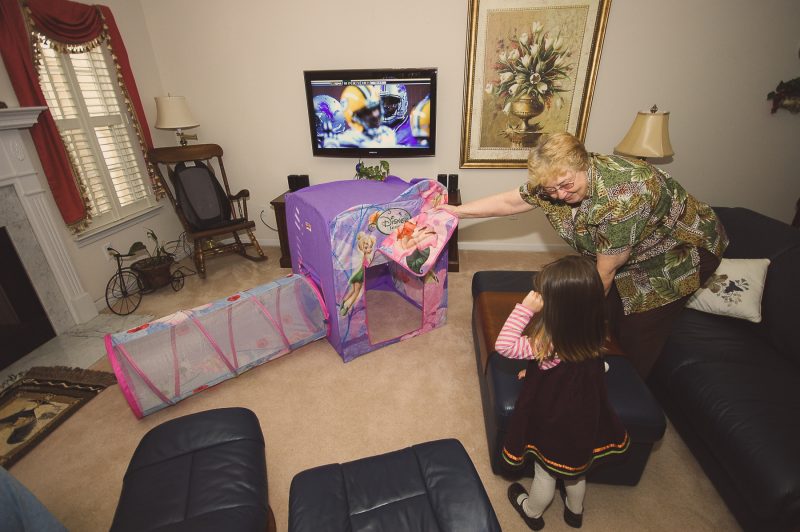
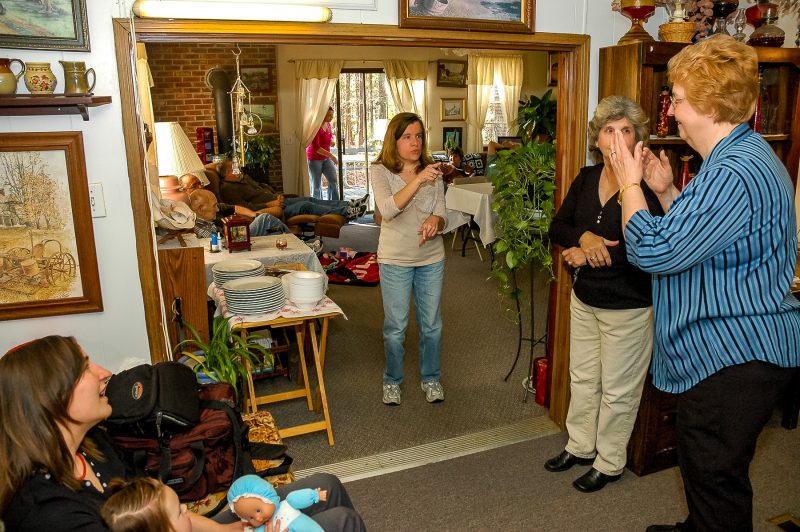
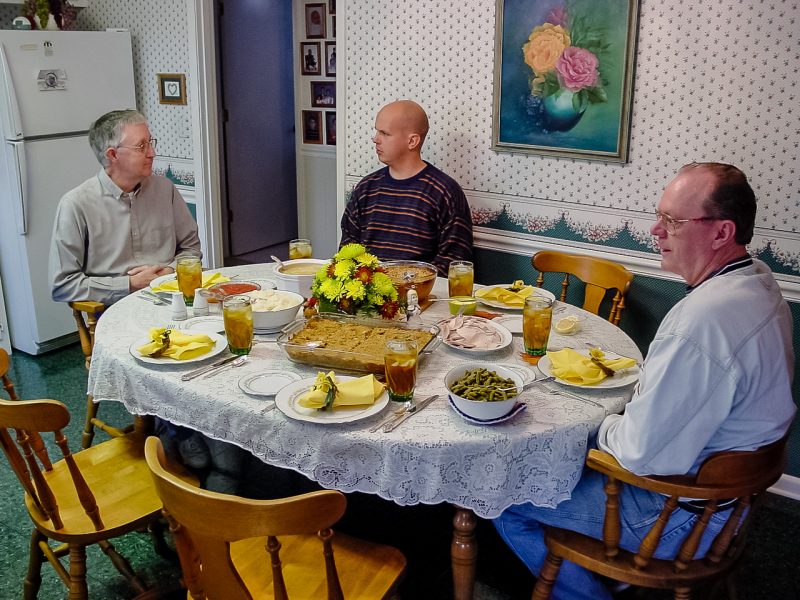
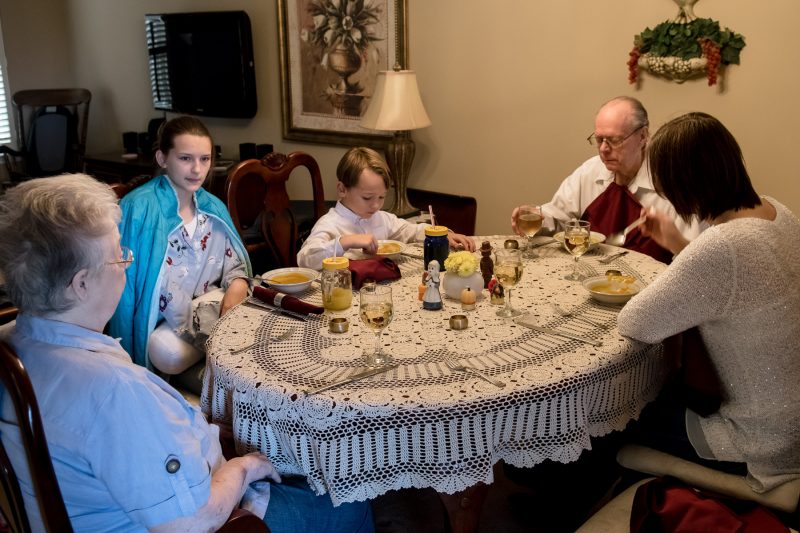
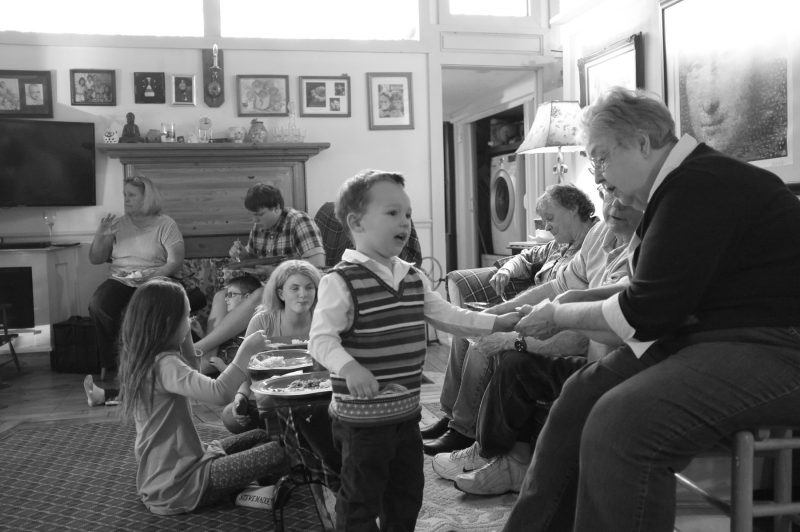
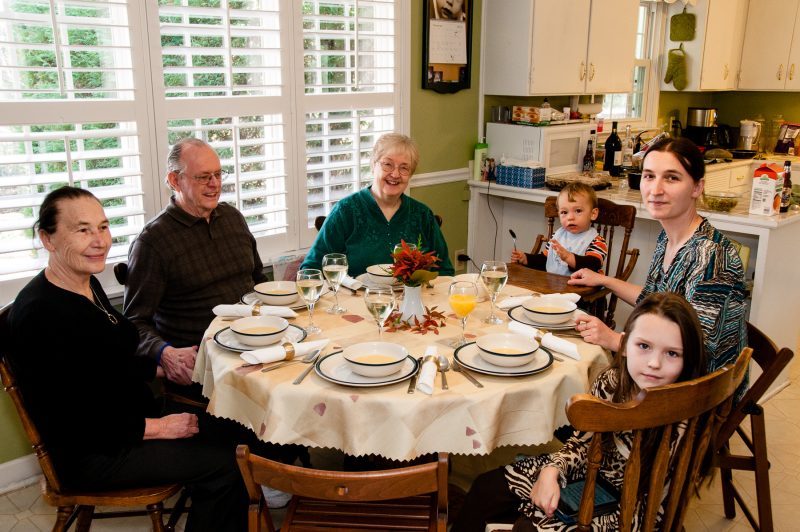
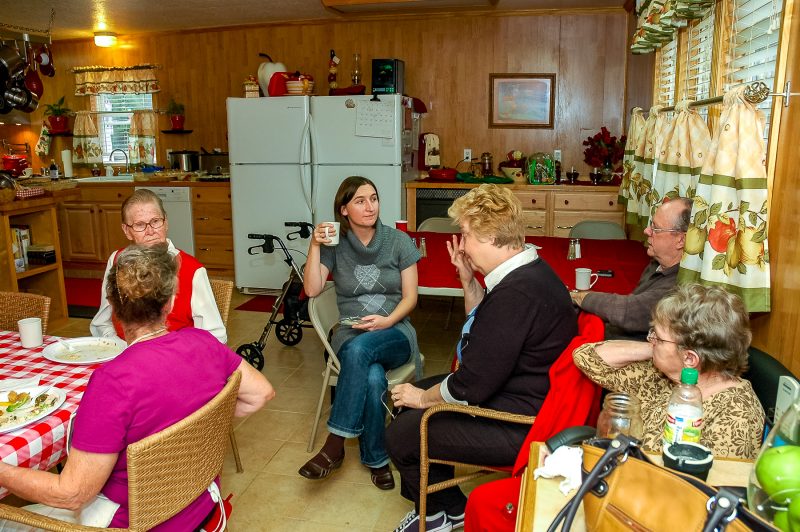
During our first Thanksgiving without Nana in 2019, we all went for a portrait and took Nana with us — the wound was still raw for everyone, but especially Papa. His first Thanksgiving without Nana in forever.
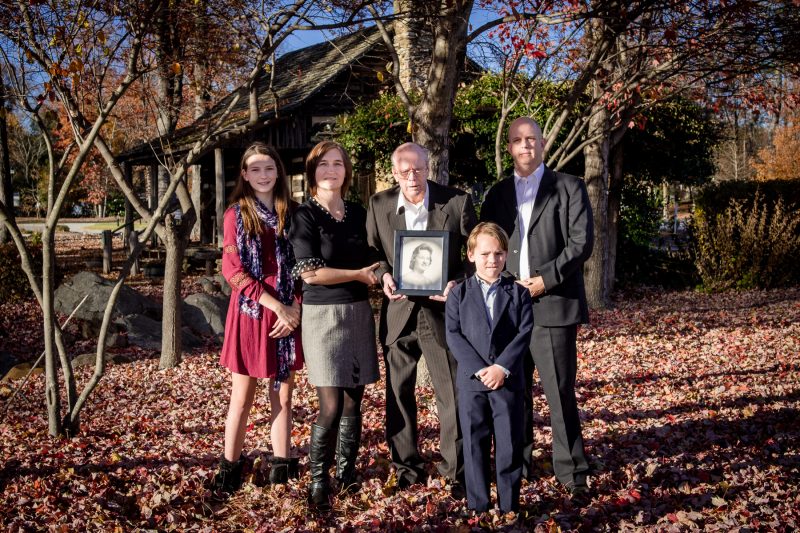
This is our first Thanksgiving without either of them. The plan to go visit Aunt D, who helped take care of Nana when she first came back from rehab, fell through as did our plan to visit with cousins. Our Polish family from North Carolina — family in all ways that count, at any rate — had other plans for Thanksgiving, so we spent it just the four of us. Without turkey.
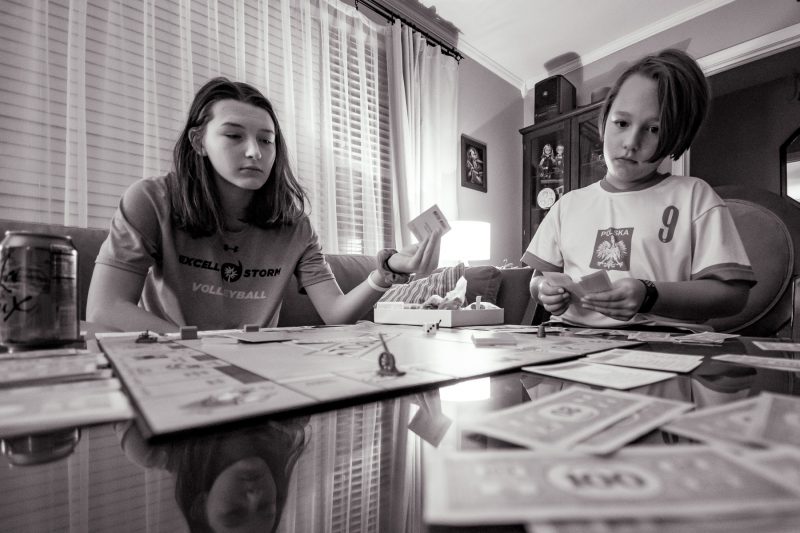
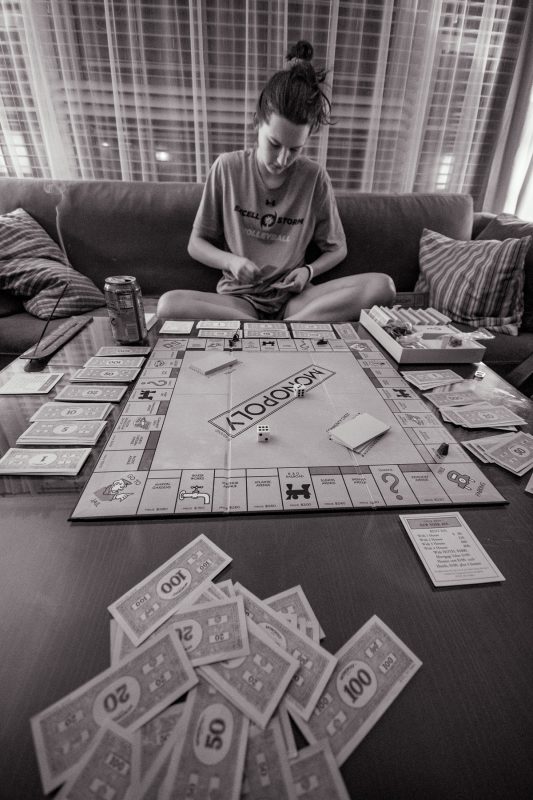
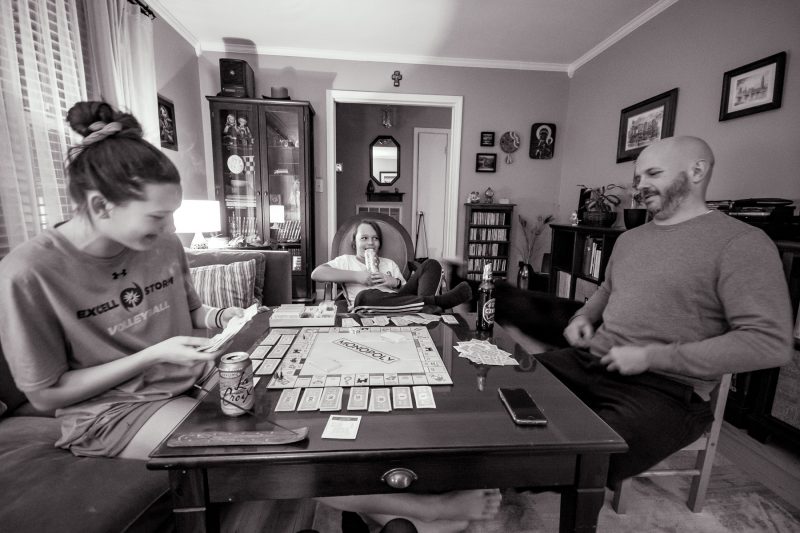
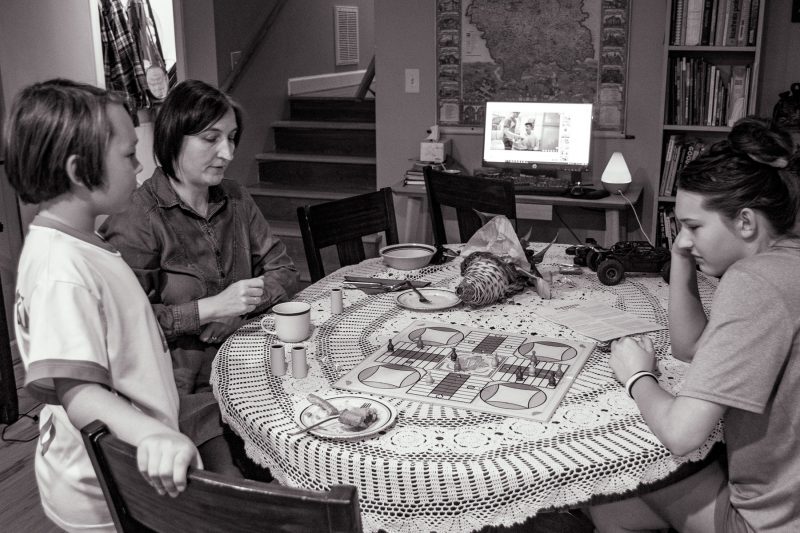
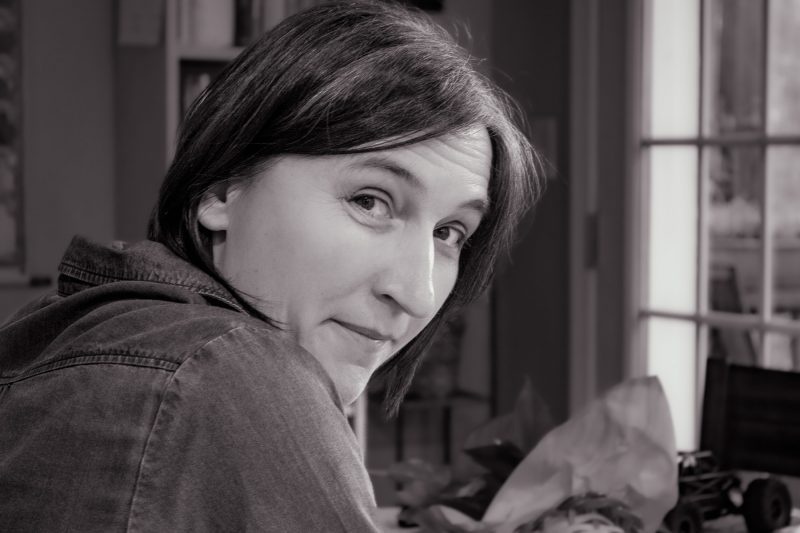
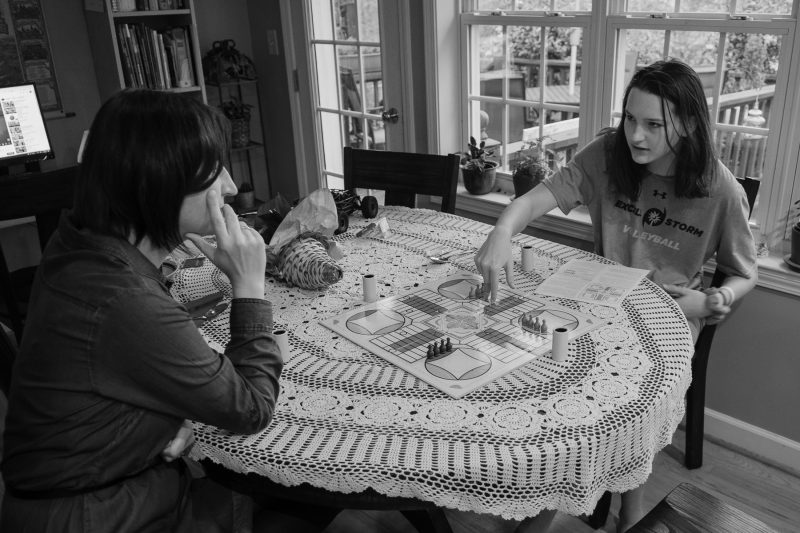
But with games. What’s Thanksgiving without games?
Thanksgiving 2020
Thanksgiving 2019
Thanksgiving 2018
Thanksgiving 2017
Thanksgiving 2016
Thanksgiving 2015
Thanksgiving 2013
Thanksgiving 2012
Thanksgiving 2011
Family and Food: Thanksgiving 2010
Interrupted
Fourth Thursday
Thanksgiving Games
Thanksgiving 2006
Thanksgiving 2005
When we put Nana’s ashes in the memorial bench, I had one thought lingering in the back of my mind the entire time: soon enough, we’ll be doing this for Papa as well.
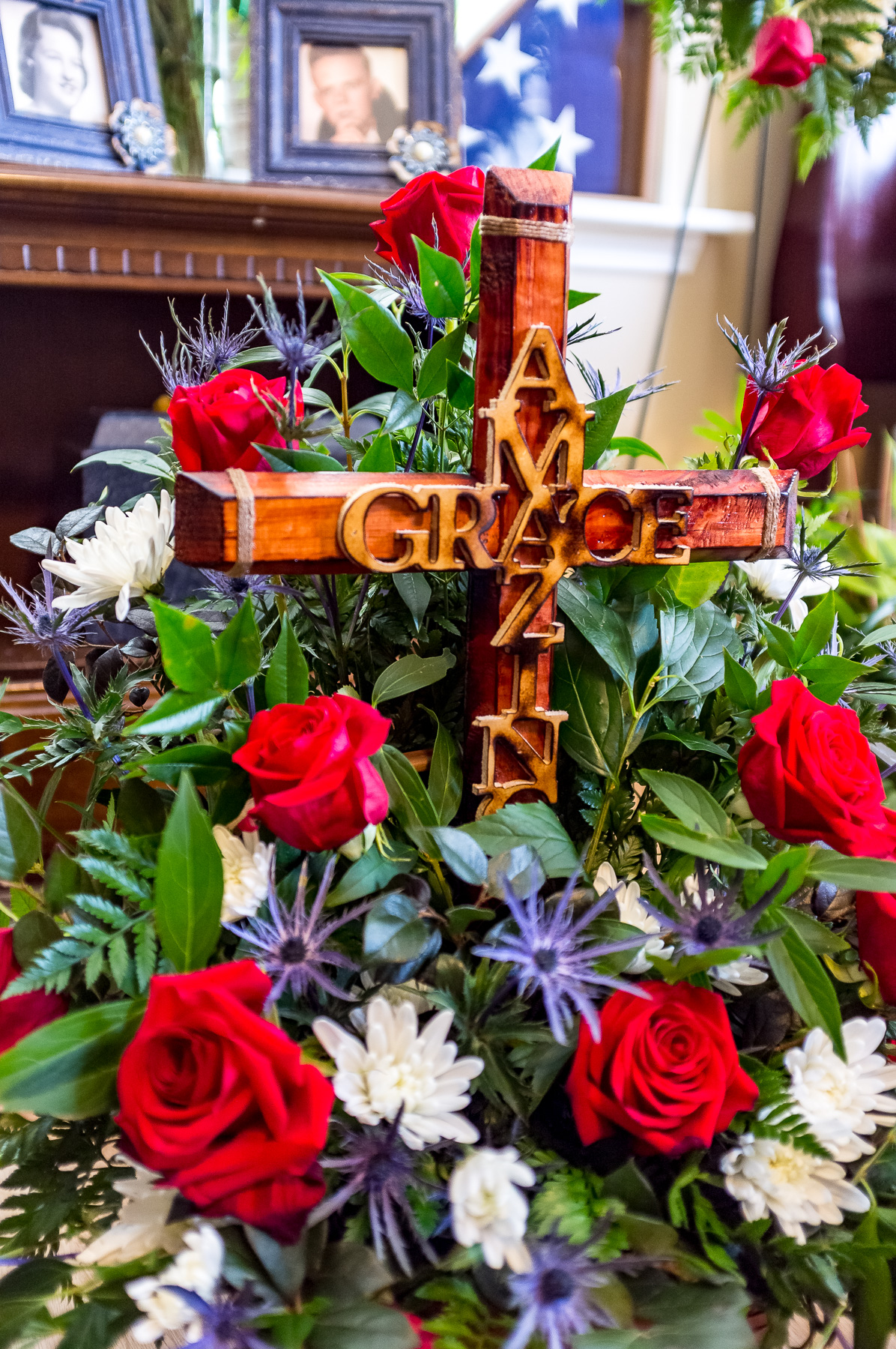




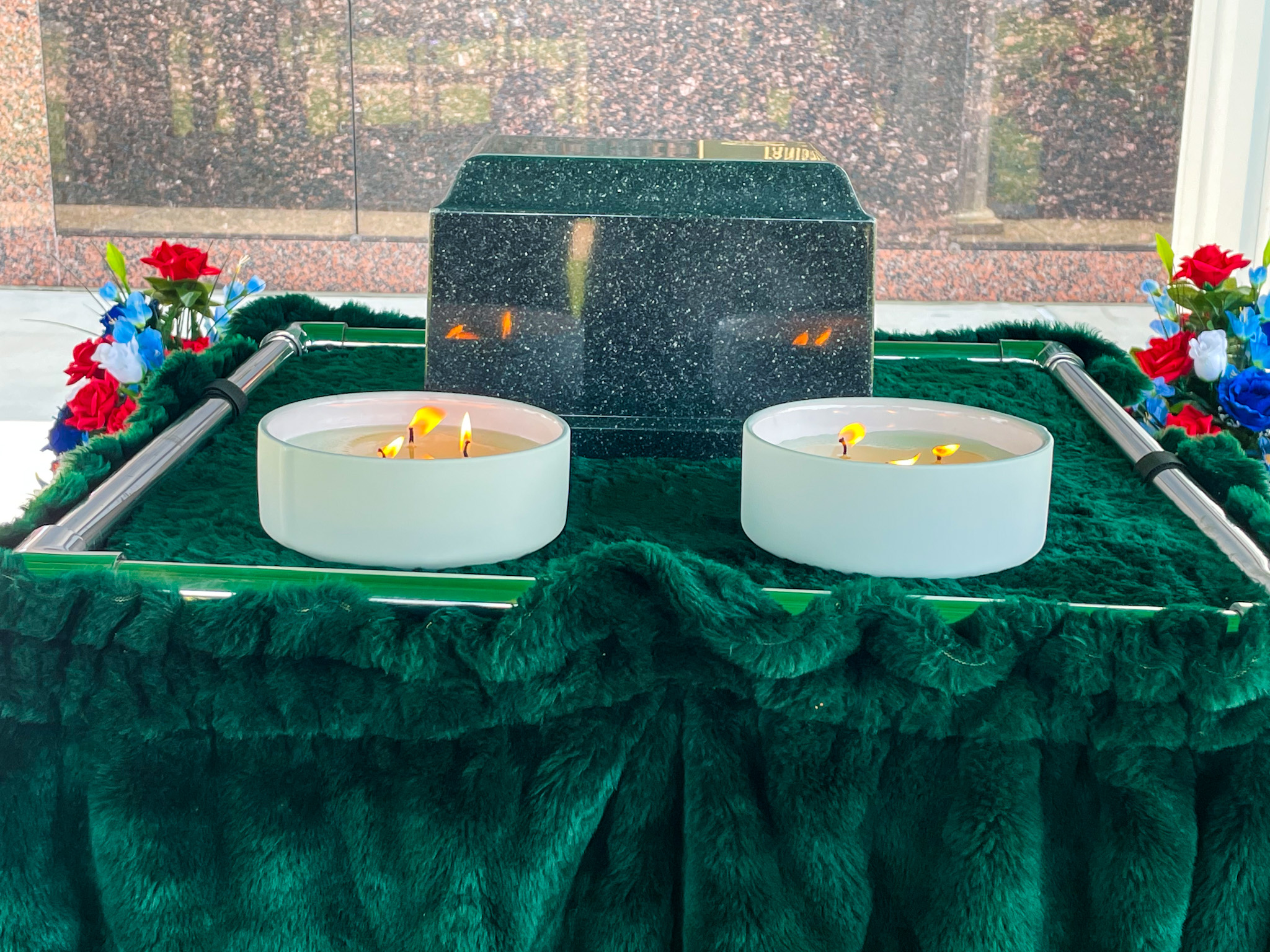
So today brought a certain closure to it all. My parents are in their final resting place. Their urns are touching, together again.
During the short service, led by Nana’s and Papa’s pastor, there was talk of the hope we have in Jesus, the hope of eternal life together with God. I sat staring at Papa’s urn, hoping the topic wouldn’t come up in the after-service chat. I always feel awkward in those moments because I play along, agree with whoever is talking, and even say things that I don’t even mean or believe. Our neighbor, for example, was talking to me the other day about Papa’s passing.
“Well, he’s with Omi now, and they’re probably still hugging,” she said.
“No,” I laughed, “she probably isn’t done fussing at him yet.”
I don’t believe that, but I felt it was something that would give our neighbor a smile, and having lost her husband only this spring, I thought laughs are probably all too uncommon in her life these days.
In the evening, some family Uno, three-hand cribbage, and of course, our family favorite, badminton.

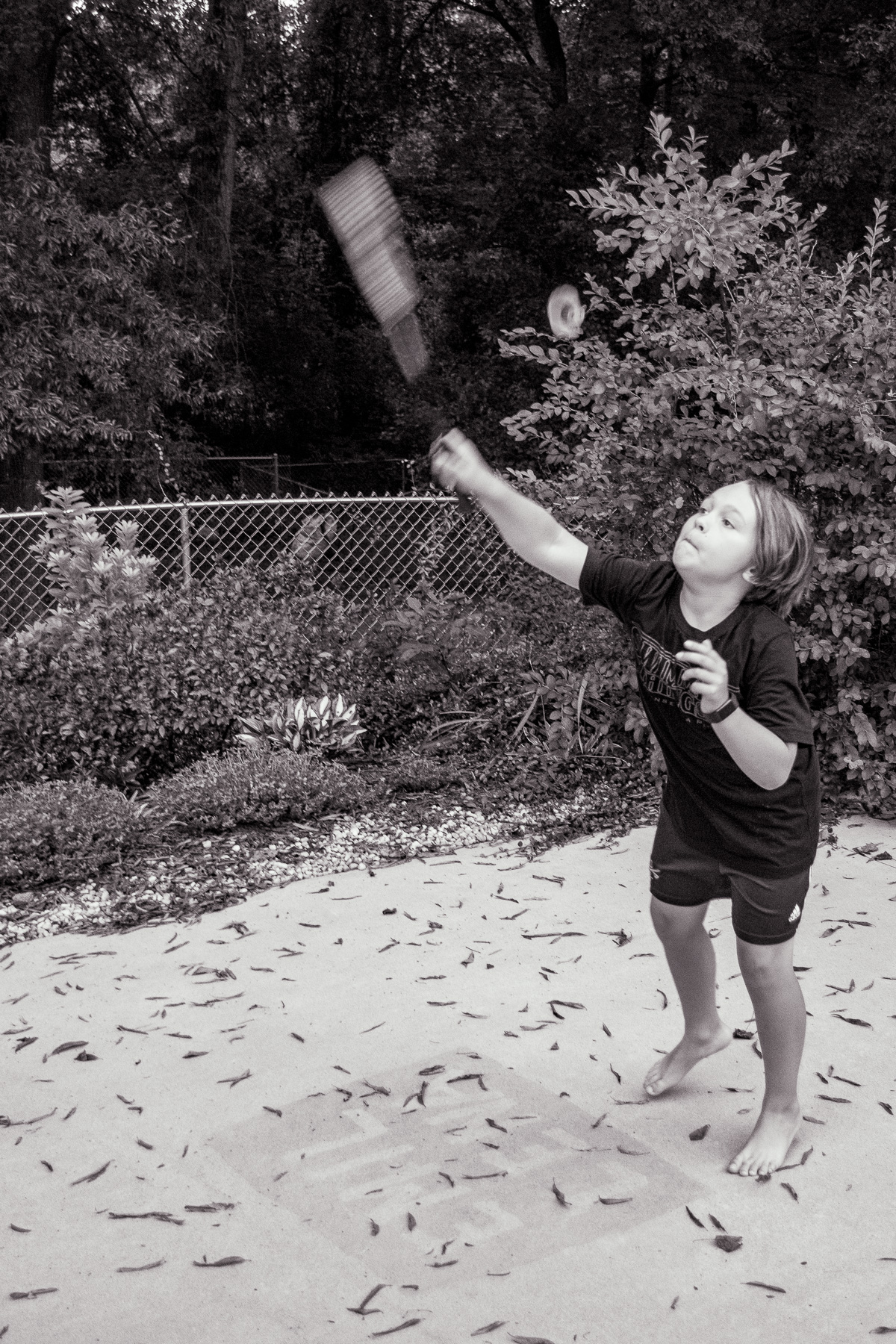
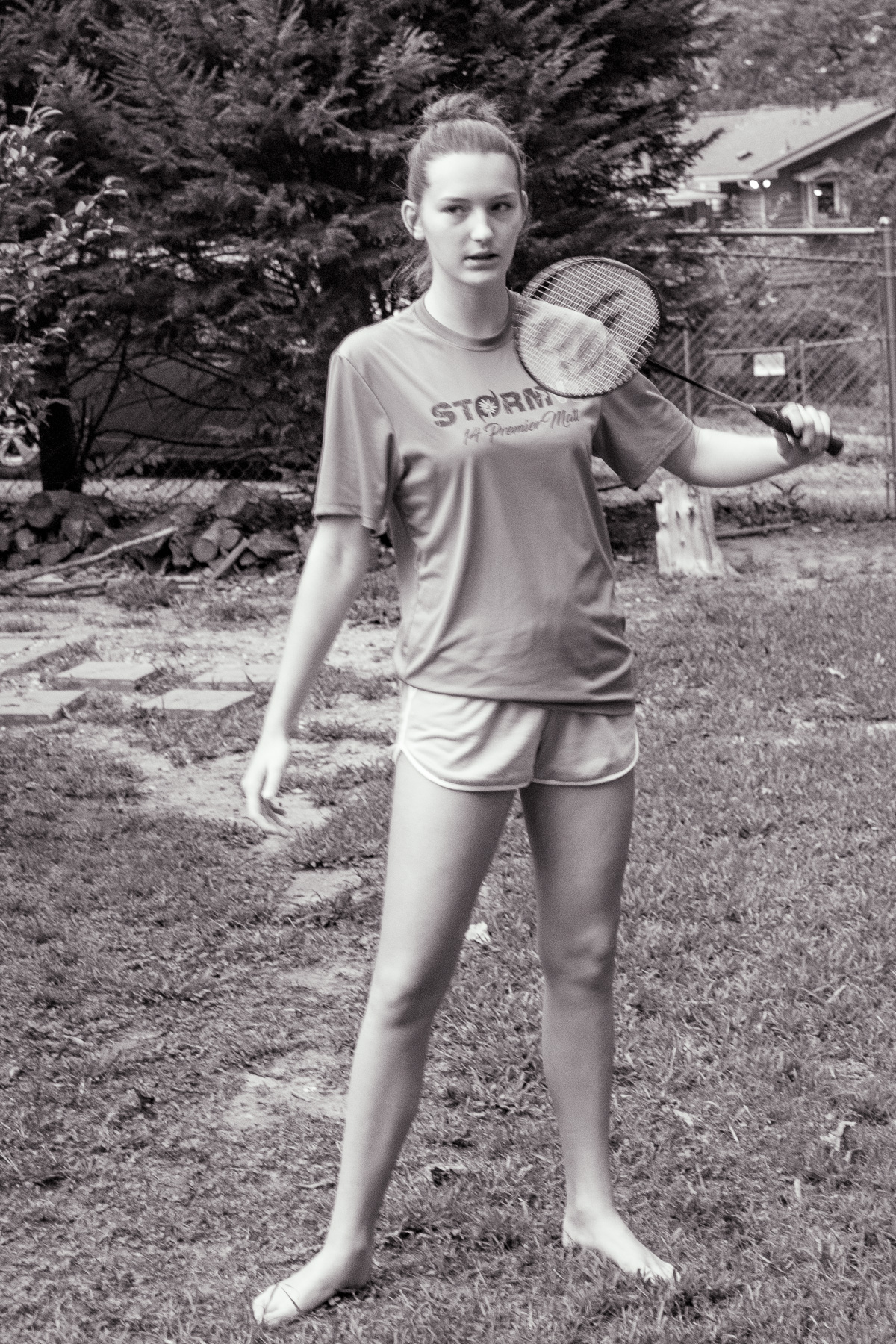
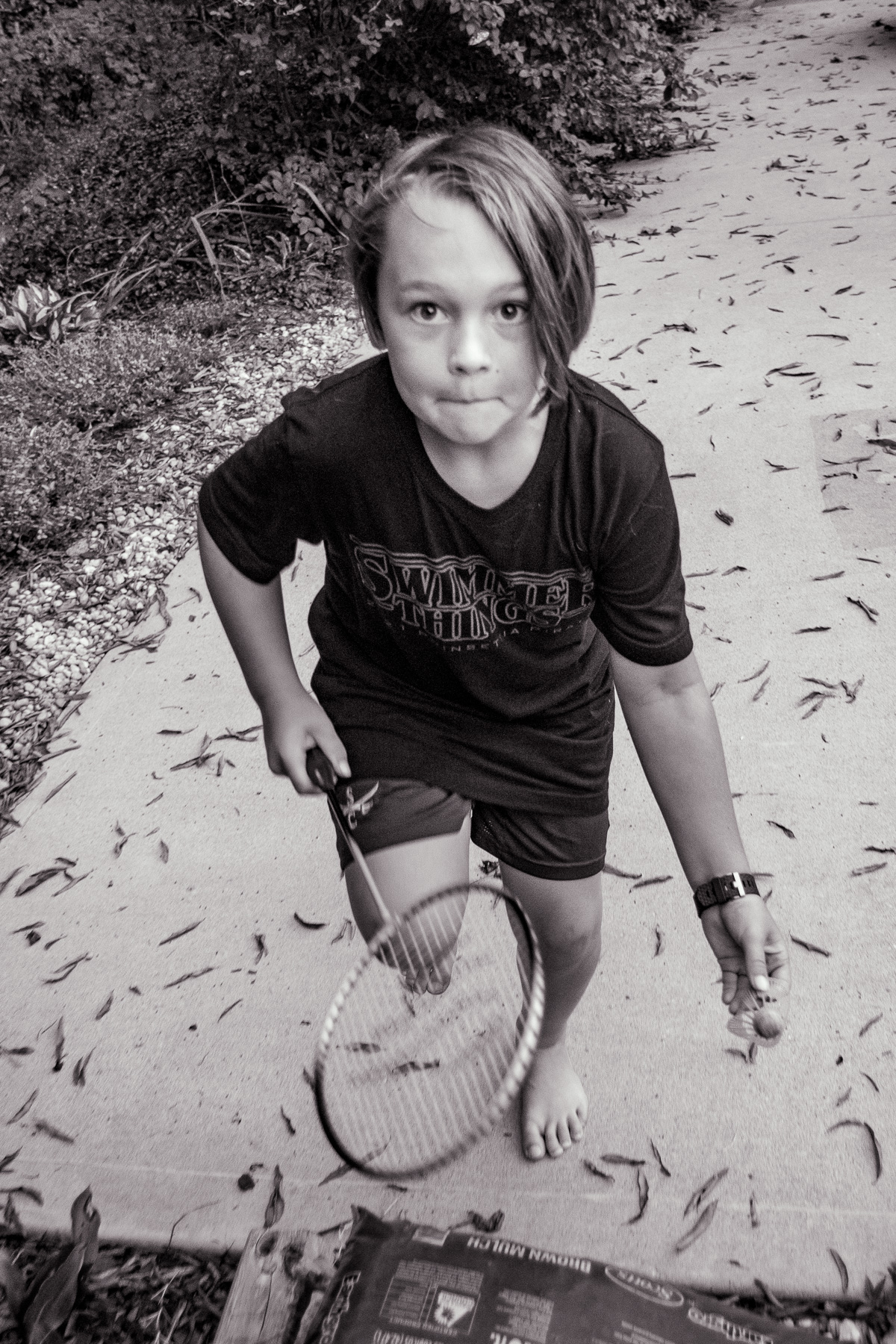

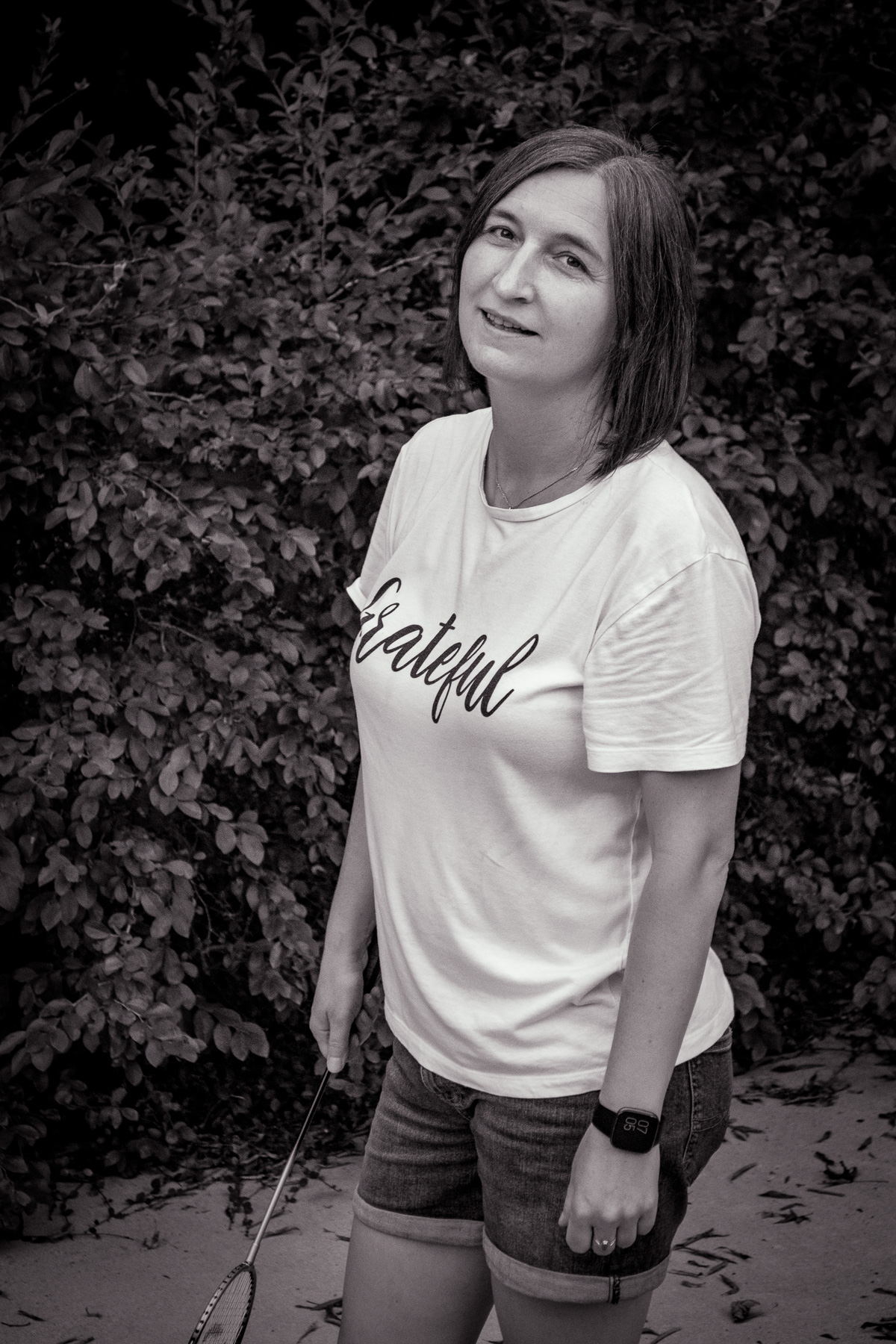
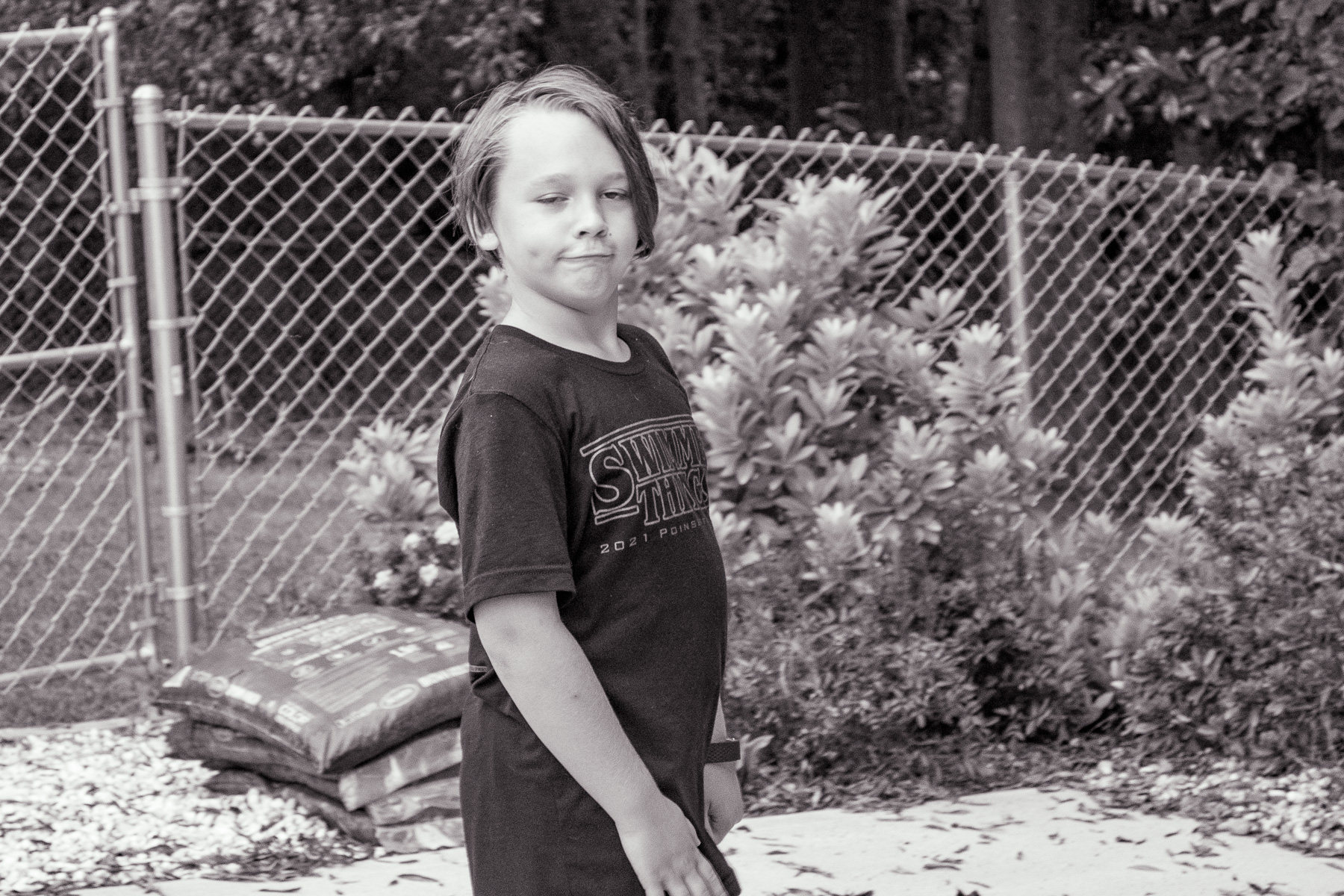

Today was Papa’s memorial service. Unlike with Nana, I decided to eulogize my father. I’d planned everything out, but I’d planned it as I’d planned my lessons: only an outline, a general guide for what I wanted to say. I still didn’t know how to begin, though. I decided it was best to write it out.
There are three general ways a man can play his part as the male parent. The eulogy a son would write for these three different male parents varies in difficulty.
At one extreme is the absent or abusive male parent. He doesn’t deserve a name because he hasn’t fulfilled his obligations: he’s simply the male parent. The only real difficulty in writing a eulogy for such a man is whether or not to give into the temptations a son might have to use the eulogy to excoriate his male parent or simply to say nothing at all.
At a bare minimum, a man might fulfill his most basic obligations by providing for his children materially but for one reason or another neglecting them emotionally. Unlike the first example, we might call these men fathers, but there’s little thought that’s going into a eulogy for such men. A few empty platitudes and cliches and it’s done.
And then there are the dads, the men who give themselves to their children unconditionally and unreservedly. Eulogies for these men are the hardest — not because, as with the second example, it’s challenging to find much to say about them beyond platitudes. Eulogies for such men are difficult because there’s never enough time to say all the things that need to be said. One must cut. One must eliminate. One must disregard. A eulogy for such a man has to narrow down an exemplary life to a short speech that will never do that man justice.
I am very blessed and cursed to have this problem. How can I begin eulogizing my father when I know I’ll never want to quit? How can I narrow to a series of bullet points and anecdotes the life of such a disarmingly friendly, unflinchingly generous and selfless, incredibly patient, and unconditionally devoted man? In short, I can’t, but I know I don’t have to. Everyone in this room saw my dad in this light.
The reason there are this many here and many more present in spirit is the fact that the first thing everyone noticed about my father was how incredibly friendly he was.
The rest was an outline — the general shape I wanted things to take with an idea of how to transition from one idea to another.
Friendly
Never met a stranger
loved talking–last one to finish eating / first to start talking
all the stories he told
navy
debt collector
getting hit by truck
we could all probably finish his storiesonce he became your friend…
Generousness/selfless
Put his own interests second consistently
shrimp
giving of time for others in churchLeads to a lack of ego / Ability to laugh at self
The Coke can with Maw-maw: amusingly impulsive
Making fun of his singingsomeone this selfless inevitably has patience because he’s always put himself second
Patient
A man of infinite patience
Mom never said, “Wait until your father gets home”
never got really angry but once (lard cookies)leads to Always seeing the good in others
reeling in MomUnconditionally devoted/loyal
To mom most of all
stopped attending because he would not leave her alone
example of a strong marriage and that devotion showed to everyone
Afterward, as with Nana’s service two years ago, we had a small meal and everyone sat and chatted. We told each other the stories Dad told so often and so enthusiastically. We recited all his funny sayings, especially all the silly ways he’d answer a question affirmatively. Is a pig’s rump pork? Does a bear live in the woods? Is the pope Catholic? We laughed a lot. We cried a little.
I think Papa would have approved.
